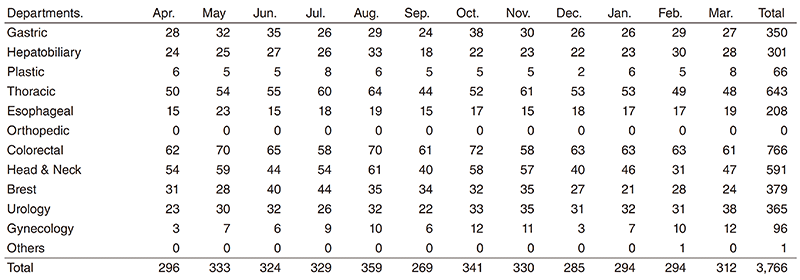Annual Report 2018
Surgical Center
Ryuichi Hayashi, Chiemi Saito
Introduction
The Surgical Center performs functionpreserving operations for ordinary cancer patients as far as possible, in consideration of their quality of life (QOL), but depending on the case, extended surgeries may be performed to cure localized and highly progressive cancers. Moreover, thoracoscopic and laparoscopic surgeries are routinely indicated to treat various cancer patients.
The Team and What We Do
IDuring this period (2018.4 ~ 2019.3), 3,766 cases underwent surgical treatment (Table 1). To preserve organ functions, limited resection or reconstructive operations are indicated in our hospital. These procedures include vertical partial laryngectomy for voice preservation, breastconserving surgery, total mastectomy with breast reconstruction, pancreas-sparing duodenectomy, partial anal sphincter-preserving surgery and bladder-sparing surgery.
With refinements in laparoscopic instruments and advances in surgical experience, laparoscopic surgery is a safe alternative for selected patients with malignant neoplasms and has fulfilled its indications. In our hospital, laparoscopic surgery has been introduced in esophageal, thoracic, gastric, colorectal, hepatobiliary, pancreatic and urology divisions, while a robotic surgical system has been in use to provide less invasive surgery since 2014. The system was indicated for prostate, rectal and gastric cancers. A gynecological operation has started since April 2019.
Table 1. Total number of operations


Education
We prioritize the education of young surgeons and all surgical groups have their own training programs for resident surgeons. Many surgeons from domestic and foreign hospitals have also visited our center to learn surgical techniques.
